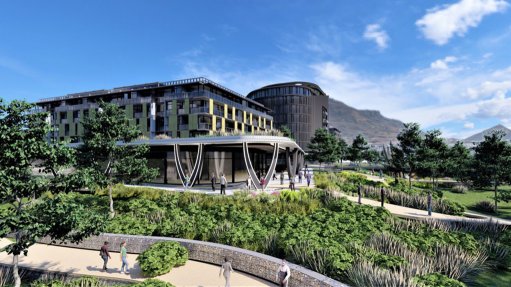
River Club artist impression
The Western Cape Department of Environmental Affairs and Development Planning has given the go-ahead for the River Club redevelopment, in Observatory, Cape Town.
The planned mixed-use development will be a boost to the economy and the people of Cape Town in the aftermath of the Covid-19 lockdown, says the Western Cape government.
The development will create about 6 000 direct jobs, including 5 239 jobs during the construction phase, as well as 13 000 indirect and induced jobs.
Further employment will be created by the tenants that will occupy the offices, residential and retail spaces that will form part of the development.
This will also help provide a lifeline to the construction industry, which has seen more than 25 000 jobs lost so far this year.
Liesbeek Leisure Properties Trust spokesperson Jody Aufrichtig says the River Club project will also serve as a first-of-its-kind landmark in the city for the indigenous groups of people in Cape Town, or First Nations, to reclaim, memorialise and share their heritage with the greater public.
The various First Nations groups in South Africa are collectively known as Khoe-San, which, in turn, comprise of various groups of people.
“The planned Heritage Cultural and Media Centre will be operated by the First Nations people and will provide critical job opportunities to members of these communities. This initiative follows extensive and constructive engagements with the senior Indigenous Khoi and San leaders comprising the First Nations Collective.
“The First Nations’ rich history will be further commemorated through the inclusion of symbols central to the First Nation’s narrative in the landscaping, architectural iconography and educational signage in the open spaces,” Aufrichtig explains.
The project will also include an indigenous medicinal garden that will be planted, cultivated and used by the First Nations people, as well as a heritage-eco trail and garden amphitheatre for use by the First Nations and the general public, which will provide a platform to celebrate this heritage.
A large part of the development will consist of safe recreational public spaces including running and cycling pathways, public viewing areas and seating areas along the rehabilitated and clean riverbank.
Twenty per cent of the development will be allocated to residential use, of which one fifth will be dedicated to developer-subsidised inclusionary housing.
The development will provide a range of socioeconomic benefits for surrounding communities. It will provide an opportunity to address the injustices of Apartheid spatial planning and to rehabilitate the current degraded, inaccessible private space into a publicly accessible amenity in an urban park environment, with significantly enhanced ecological value.
It will also create significant employment opportunities, anchored by major tenants, and restore and celebrate the First Nations’ rich heritage and history.
“In this tough economic climate, we look forward to delivering a development that presents many exciting opportunities for the people of Cape Town and the Western Cape,” says Aufrichtig.